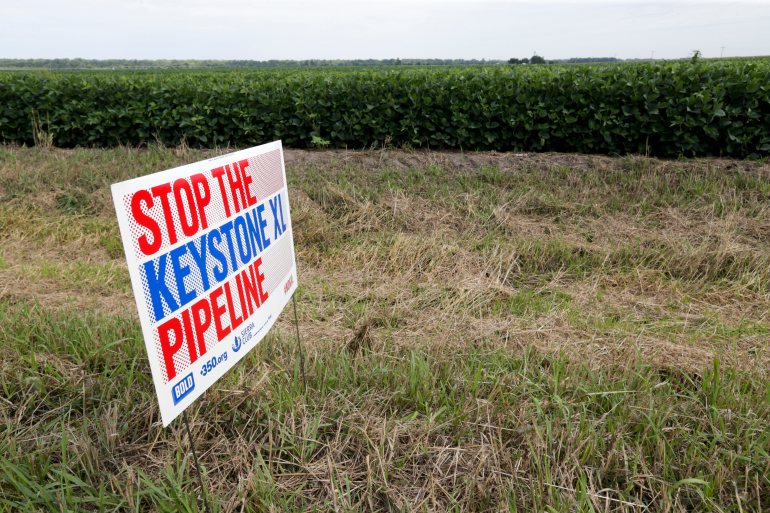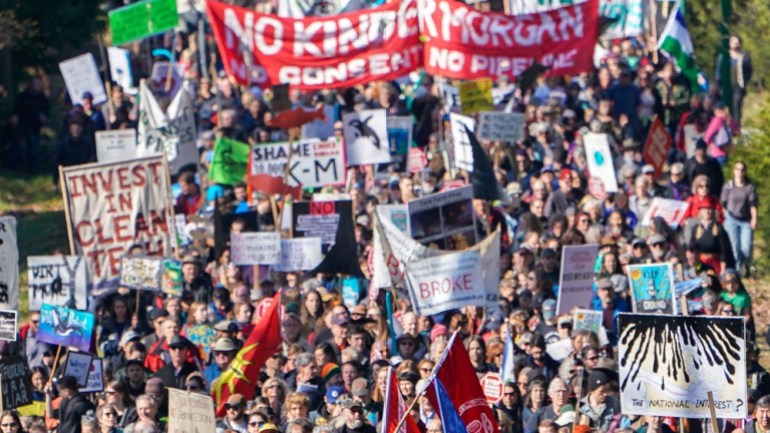Alberta politicians slam ‘vicious’ Netflix cartoon for kids
Right-wing Premier Jason Kenney says Bigfoot Family, a cartoon with talking animals, defames the oil and gas industry.

The provincial government in Canada’s oil-rich province of Alberta is up in arms over a Netflix cartoon for children that Premier Jason Kenney says is a “vicious” attack on the oil and gas industry.
The cartoon, Bigfoot Family, depicts Bigfoot, his family and their animal friends – including a talking raccoon, moose and bear – trying to stop a company from flooding an Alaska valley with oil.
Keep reading
list of 3 items‘Vindication’: Keystone critics welcome Biden nixing pipeline
Alberta leader asks Biden to ‘show respect’, hold Keystone talks
It has not gone over well with Kenney’s United Conservative Party government – or its widely criticised “war room”, known as the Canadian Energy Centre (CEC), founded in 2019 to counter what Alberta said was disinformation around its energy industry.
The CEC, which had its budget slashed by 90 percent from 30 million Canadian dollars to 2.84 Canadian dollars (from $24m to $2.28m) annually due to COVID-19, said last week Bigfoot Family “villainises energy workers and disparages the industry’s record on and commitment to environmental protection”.
It also encouraged people to email complaints to Netflix Canada, saying on its website more than 3,000 emails have been sent so far.
“It’s clear that they developed content designed to defame in the most vicious way possible – in the impressionable minds of kids – the largest industry in the province,” Kenney said during a news conference this week.
“Albertans and people who defend our oil and gas workers have every right to set the record straight, to put the spotlight on those kinds of outrageous lies and that kind of defamation.”
Netflix did not immediately respond to Al Jazeera’s request for comment.
‘Not surprising’
For most Canadians, the uproar has drawn eye rolls – though it does reveal a longstanding effort to hit out against anyone or anything deemed critical of Alberta’s oil and gas industry, which accounted for about 17 percent of the province’s gross domestic product (GDP) in 2017.
The Alberta government in particular has been widely criticised for creating the CEC as part of an aggressive strategy to defend the energy sector that has seen the province accuse “foreign-funded” environmental groups of waging a campaign against Alberta oil.
“The Alberta war room’s attacks on a children’s movie are ridiculous, but they’re not surprising,” Cameron Fenton, Canada team leader at environmental advocacy group 350.org, told Al Jazeera in an email.
“For years, the fossil fuel industry in Canada has tried to paint itself as the victim of some kind of unjust attack, despite being some of the richest companies on the planet, bearing the greatest responsibility for causing the climate crisis,” he said, adding that politicians in Canada have “unfortunately bought into” that argument.

In 2019, Amnesty International said it had “serious human rights concerns” with Kenney’s “aggressive approach to defending the oil and gas industry from criticism”, which it said, “exposes human rights defenders – particularly Indigenous, women, and environmental human rights defenders – to intimidation and threats”.
Last year, press freedom groups awarded Kenney’s government with the 2019 Code of Silence Award for Outstanding Achievement in Government Secrecy, saying its “war room” was particularly disconcerting.
“George Orwell’s 1984 was written as a warning. But, increasingly, it seems Premier Jason Kenney’s government in Alberta is using it as a handbook,” the groups said.
The Canadian Association of Journalists (CAJ) also slammed Alberta in January for a government-funded report into climate change reporting. The report “smeared” journalists covering the issue, the association said, and was a “conspiratorial mischaracterisation of the work undertaken by Canadian climate journalists”.
![The Suncor tar sands processing plant near the Athabasca River at their mining operations near Fort McMurray, Alberta [REUTERS]](/wp-content/uploads/2016/02/e03c0f894fff41f1845e361387c9c29d_18.jpeg?w=770&resize=770%2C432)
“Journalists should always expect public pushback for telling difficult truths,” CAJ President Brent Jolly said in a statement. “But labelling journalists as agents of disinformation based solely on their subject matter is both egregious and unfounded.”
Popularity drop
Kenney remains one of the most vocal proponents of oil and gas development in Canada and has regularly criticised Justin Trudeau, despite the prime minister’s own support for major oil pipeline projects.
Earlier this year, the Alberta premier also spoke out against US President Joe Biden for his decision to nix the contentious Keystone XL pipeline, which would have pumped 830,000 barrels of oil per day from Alberta to the US state of Nebraska.
“The comments that I’ve heard in that cartoon were quite offensive,” Alberta energy minister Sonya Savage told reporters this week, about Bigfoot Family.
“And there’s no question whatsoever that we have to find a way to counter the kinds of campaigns and the kind of narrative … that is targeted at our energy sector and discrediting the hardworking men and women of Alberta who work in it.”

But there are signs the popularity of Kenney’s government is faltering; a recent poll showed the provincial New Democratic Party holding a 2:1 lead over the UCP, with the former at 40 percent support in the province compared with just 20 percent for the governing party.
“As Jason Kenney’s government now girds for its latest cartoonish war, the premier himself is increasingly embattled,” Andrew Nikiforuk, a contributing editor at Canadian news outlet The Tyee, wrote on Monday.
“In fact, his show is in danger of being cancelled,” Nikiforuk said. “The citizenry apparently is less interested in Bigfoot than an old-fashioned big boot.”